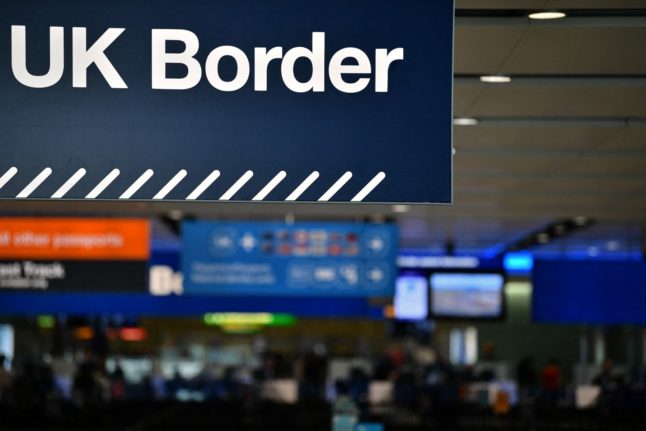Check your residency status
If the UK leaves the EU without a deal, Brits will become third country residents.
In the case of a no-deal Brexit, as The Local has reported before, Sweden has formally guaranteed a one-year 'grace period' during which Brits and their family members can stay in Sweden under the same rights. There's no need to apply for this; the exemption from usual permit laws will apply automatically, but if you plan to travel during that year, you should apply for a passport stamp proving your right of residence.
READ MORE: The stamp Brits need to get in Sweden if there's a no-deal Brexit
But after this year, it's highly likely Brits will require residence and/or work permits in order to stay in the country, and they would need to apply for these during the grace period.
“Rules will vary depending on your own circumstances, so check the basis for your stay,” the British Embassy in Sweden has said in its checklist. “During [the one-year grace period], you should apply for a residence permit. Once you have applied, your stay is legal and you can continue to receive social benefits until you have got a decision, even if this takes more than a year.”
As of August 2019, it remained unclear what rules would apply to self-supporting Brits, including pensioners as well as those who do not have a job or Swedish partner during the one-year grace period. It's also unclear whether current regulations around work and residence permits would apply, or whether the government would introduce new legislation to deal with the affected Brits.
EXCLUSIVE INTERVIEW: Sweden cannot guarantee Brits' future in no-deal Brexit

Hans Dahlgren was appointed Sweden's EU minister in 2019. Photo: Anders Wiklund/TT
And those who have already applied for Swedish citizenship but not yet received a decision by the date of any no-deal Brexit must also apply separately for residence.
“An outstanding application for citizenship does not in itself give you the right to stay. If your citizenship application has not been approved towards the end of the one-year exemption, you should apply for a residence permit in the meantime. This will not affect your citizenship application,” advises the embassy.
As for those who have not yet been in Sweden long enough to apply for permanent residence or citizenship, the Swedish parliament in July 2019 approved legislative changes that would allow Brits to count their time in Sweden as EU citizens towards a future residence permit application.
READ ALSO:
-
British Öresund commuters protected from no-deal Brexit: UK embassy
-
Swedish business leaders warn Brits risk work permit rejections after no-deal Brexit
- No-deal Brexit: Which EU member state is being the most generous to Britons?
Ensure your UK passport is valid
“UK passports must remain valid for the duration of your stay in Sweden,” the embassy has warned.
This means you should check when you need to renew it, which you can do using this tool. There should be at least six months left on a passport in order to travel to most countries in Europe.
Don't be caught out by any rule changes affecting passport validity after a potential no-deal Brexit. In cases where a current passport was renewed before the previous one expired, extra months may have been added to its expiry date. These extra months may not count towards the six months needed, meaning you may need to renew your passport more than six months before the stated expiry date. If travelling after October 31st 2019 in the event of a no-deal, your passport will need to both have at least six months remaining, and be less than ten years old.
Even with a valid passport, as noted above, it's a good idea to get your passport stamped if you're a British resident of Sweden planning to travel outside Sweden during the one-year grace period. Your right to travel within the Schengen area will be applied automatically, but the stamp ensures there won't be any issues proving you have right of residence when returning to Sweden.
The stamp will be issued by the Migration Agency, and once a decision has been made (the agency has said it's aiming for a one-week turnaround) you can take your passport to be stamped at one of 12 service centres across the country.
The agency initially said that it would be possible to apply via their website from March 22nd, with applications processed from March 30th. But after EU leaders agreed to an extension of Article 50, postponing the date of Brexit, the agency said the stamp applications would also be delayed and would become available on their website only if a no-deal Brexit was confirmed.
As for Brits who want to visit Sweden for up to three months but not to stay long-term, this will be possible without any visa or passport stamp.
READ MORE: Sweden puts 'passport stamp' for Brits on hold

Photo: Adam Wrafter/SvD/TT
Exchange your driving licence
If there's a no-deal Brexit, British licences will no longer be valid in the EU, but the Swedish government has said it plans to give Brits a one-year grace period during which they can continue driving using their UK licences.
After that, however, Brits would likely need a Swedish driving licence, and it's possible to apply to exchange the licence at any time. This is done by applying to the Swedish Transport Agency.
Otherwise, third country nationals without an agreement with Sweden covering driving licences typically need to apply for a Swedish licence from scratch, taking a theory and practical test at an estimated cost of at least 4,000 kronor.
Brits visiting Sweden after the one-year grace period but not intending to be registered in the country (i.e. without a personnummer or coordination number, including tourists and short-term visitors) would be able to drive in Sweden using their British licence, even in the event of a no-deal Brexit.
READ ALSO: How to change your driving licence to a Swedish one
Students: speak to your university
If there's a no-deal Brexit, British students will be able to use the one-year grace period to apply for a student permit.
Usually, non-EU students pay tuition fees in Sweden, but the Swedish government has prepared legislation which would exempt UK nationals from paying student fees until 2022, if the student was either admitted to that course before the date of a no-deal Brexit, or already had residence in Sweden by that date. This legislation would come into force after a no-deal Brexit.
It's also worth being in contact with your university's student office so that they can update you with any new procedures or requirements, whether specific to that university or to all of Sweden.
READ ALSO: Confused about Brexit? Here are 8 essential websites for Brits in Sweden




 Please whitelist us to continue reading.
Please whitelist us to continue reading.
And I was under the impression that Sweden will follow the UK. I was going to continue buying Swedish Volvo’s even though the ones I buy are made in Gent!!